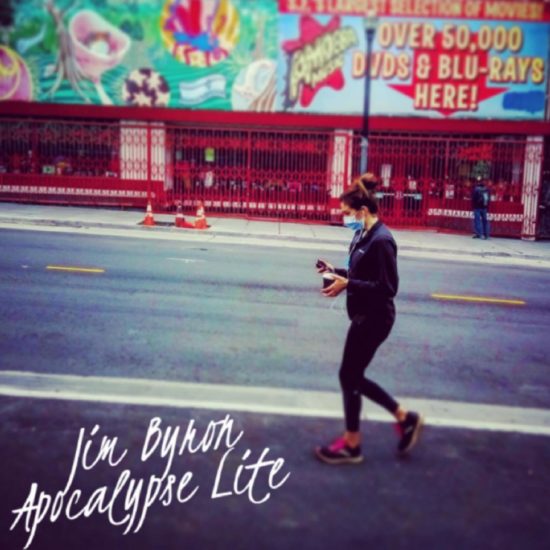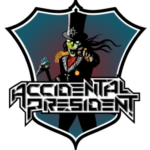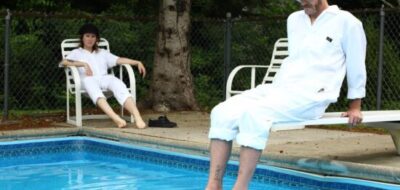Music has become wide open. No longer does an artist have to stay within one specific genre or style. Being an independent artist provides a freedom to create your own lane. Our recent find Jim Byron is a perfect example of this.
Based in the U.S. the alternative musician, songwriter, and producer has dove headfirst into making music. Over the past 5 years, Jim Byron has released over 20 albums. Quite prolific. Influence is taken from pop, folk, hip hop, and rock to craft his unique sound that evolves from record to record.
A standout track from his last record Apocolypse Lite is “Psychiatric Lottery”. Right from the start, it is obvious that Jim Byron has an ear for crafting head bopping beats. As the song moves on his lyric writing skills show off as well. Being mentored by two poet laureates: Jack Hirschman of San Francisco and the late Barry Spacks of Santa Barbara has had a profound effect. This is thought-provoking music!
We had the chance to chat with Jim Byron to get a little deeper into his musical mind. Enjoy the interview here:
First off, what is it that drives you to make music?
It’s hard to put my finger on. Making music is something I’ve always known I wanted to do since I was a kid. It’s just something I’ve always pictured myself doing. But to be more specific, sometimes I just want to hear a certain piece of music, and it doesn’t exist. So I have to make. I have phases sometimes when I listen to my own albums. Sometimes what happens is I just want something new to listen to because I’ve heard everything else so many times over. I’m sometimes a lot like a fan of my own music, except I have the ability to make new original music on the spot. So I’m creating my own demand. Other times, I’m not so much a fan of my own stuff, so I’m motivated to make something different than I’ve ever made before.
How would you describe the Jim Byron sound?
As an artist, I want to be genre-fluid. I have a different sound every album I put out. If you go through my albums, you’ll definitely notice I don’t stick to one genre or sound. On different albums, I come up with different styles to play the guitar, different arrangement of instruments, et cetera. But if there was one thing that ties them all together it would be this. I produce all my own songs on my phone using GarageBand and a really nice microphone. I’ve gotten pretty good at what I do, but I’m not quite a professional yet. I think right now the Jim Byron sound is a sound on the threshold between being demo and studio quality. To the untrained ear, it might sound professional. But to a professional, it probably sounds very DIY. I’m hoping to start recording in professional studios in the future though, so this sound could change.
Which artists have had the biggest influence on you?
To be honest, I don’t like answering questions like this. There are so many, I feel like I’m under a lot of pressure to name as many as possible. I’ll say the number one artist who’s had an impact on me is Bob Dylan. When I changed my name to Jim Byron back when I started this journey in 2010, I chose that name because it had a similar rhythm to Bob Dylan. In 2015, I came to Minnesota to backpack around and explore the places where Bob Dylan once lived. I was homeless, but I made money from street performing, so I got around. I was only going to stay here for a couple months. But the people here were so kind, they kept taking me into their homes. It wasn’t like that most other places. So I ended up staying. And now I’ve put out about 30 albums worth of music since moving here. So I’d say things turned out well. I have a bit of an inferiority complex, because I don’t know if I can ever be as good as Bob Dylan. I don’t necessarily want to “be” Bob Dylan. It’s that I need to hold myself to a high standard, and, to me, he is one of the best.
What is your songwriting process? How does a song come together for you?
That’s a good question. It’s usually a different process with each album. But to explain it step by step, here’s how it goes. Usually when I start writing a song, I start by recording a demo piece by piece. I write and record each section separately. I record it in such a way as to let each section end so that the next section can be added onto it seamlessly. Most of the time up until now, I would then record the song I most recently demoed. I would keep going like that until I had an album. Usually, I have a musical style in mind when I start writing for an album. So I know what I’m doing going into it, and I just keep the process going until I have enough songs I like for an album. The way the song comes together has a lot to do with what kind of album it is on. For the song ‘The Psychiatric Lottery’, I actually wrote the chord progression for a song which was supposed to go on the album, The Quarantine Club. It didn’t come out right though. But I think it turned out pretty well when I re-used it to put on Apocalypse Lite. Sometimes a song will work on one album, and not another.
Your song ‘The Psychiatric Lottery’ really jumped out to me. What can you tell us about that track?
Sure, I can try. This song, along with the rest of the album, Apocalypse Lite, was written in a “write first, figure out what it means later” fashion. I saw myself as weaving tapestries of words together in a complex pattern. I call it Rorschachism, because the way it’s written, it has no original intended meaning, just like a blot test has no intended shape. I basically just tried to stick to the common theme of mental illness. I didn’t even know what the title was going to be until after I wrote it. The concept of a “psychiatric lottery” really struck a chord with me. In the first verse, the song touches on the commoditization of mental illness. “Citizen of a psychotic state, grand prize is a dystopian fate. You’ve won the psychiatric lottery. You can buy and sell your mental property. Put your paranoia out on auction. You can get a pretty penny for your conscience.” To be honest, it’s not easy for me to unpack these lyrics in a brief way. It can be looked at so many different ways. Maybe it’s about what a philosopher, Gilles Deleuze, talked about, how society itself is schizophrenic, and normal people are the crazy ones; and in that paradigm, the mentally ill person who doesn’t jive with society is the true individual. So maybe having a mental illness can be like winning the “psychiatric lottery” because it gives you such a different perspective of the world.
You have been tremendously prolific. Where do you find the inspiration to write?
Writing songs and recording music comes so naturally to me, I kind of think of it as like asking an orange tree how it grows so many oranges. It’s just want it was designed to do. The tree got lucky to be planted in a place where it grow fruitfully. It’s the same as with me. Before my life fell into place the way it has, I wasn’t able to be nearly as productive with songwriting and recording. But to try to answer your question, I get inspiration from many different sources. Usually every album will have its own theme. So I will explore that theme from a bunch of different angles. The idea of creating a finished album inspires me enough to stay focused on the themes and see them through to the completion of the albums. Sometimes it will be a song that inspires me. I’ll listen to the song and hear it doing something I like, so I’ll say I want to try that. Sometimes I don’t have any inspiration. Sometimes it’s not some kind of inspiration compelling me to write the song. I’ll just write because that’s what I do to pass the time. Then the finished song will be the thing which inspires me. Sometimes my only inspiration is total boredom.
Share some advice for other artists with music to get out of their heads into the world?
I’d say to go out there and try to find community surrounding one’s music. Go to local shows, open mics, et cetera. Surround yourself with people who inspire you. For me, becoming a full time musician was a big sacrifice. I had to give up living a conventional life. I ended up couch surfing for a few years. I’d say try to support yourself with your music. If you set up a life for yourself which is centered around music, and if you create rewards for yourself by making music, and you hang around with peers who are also creating, it will just come naturally to you.
Give us a look at the future of Jim Byron?
I don’t know! Right now I’m barely able to wrap my mind around the present. I’m thinking of going into a real recording studio and recording some professionally produced tracks. The future is one thing I try not to think about. I can tell you what I’m doing now. After putting out a bunch of albums this year, I’m taking a hiatus. I’m taking my time writing new songs, and I have no deadline of overarching “theme”. I’m also trying to raise the bar a bit with my songwriting. I don’t know when you can expect the next album to come out, but hopefully it will be worth the wait.
Find more from Jim Byron HERE









